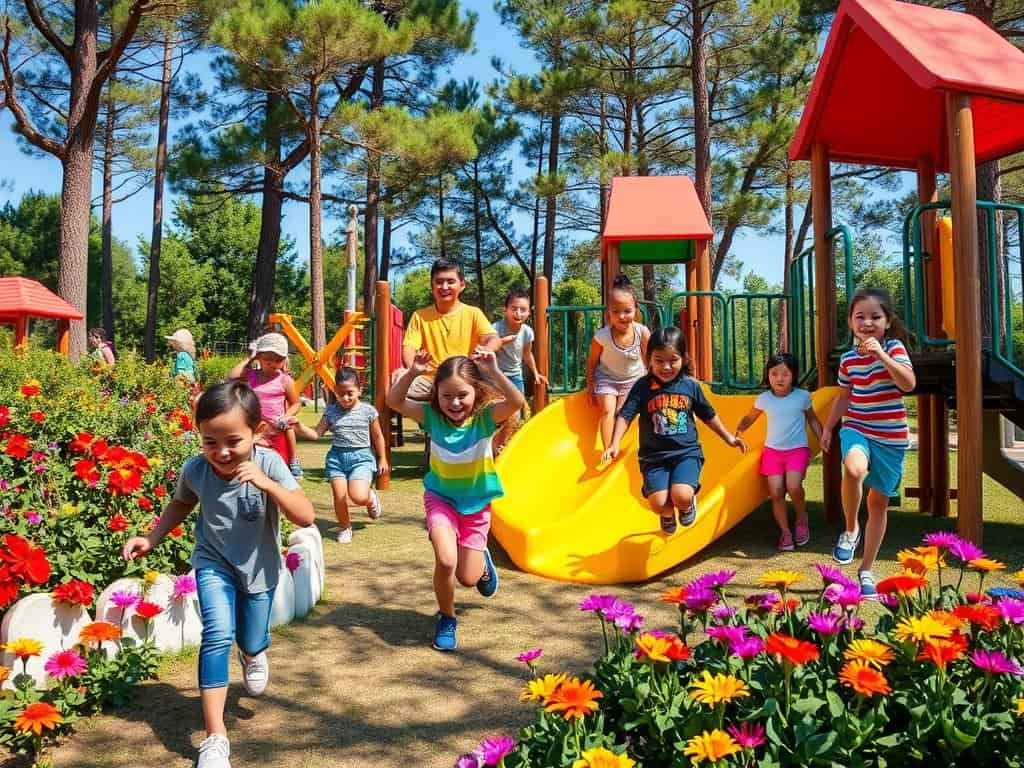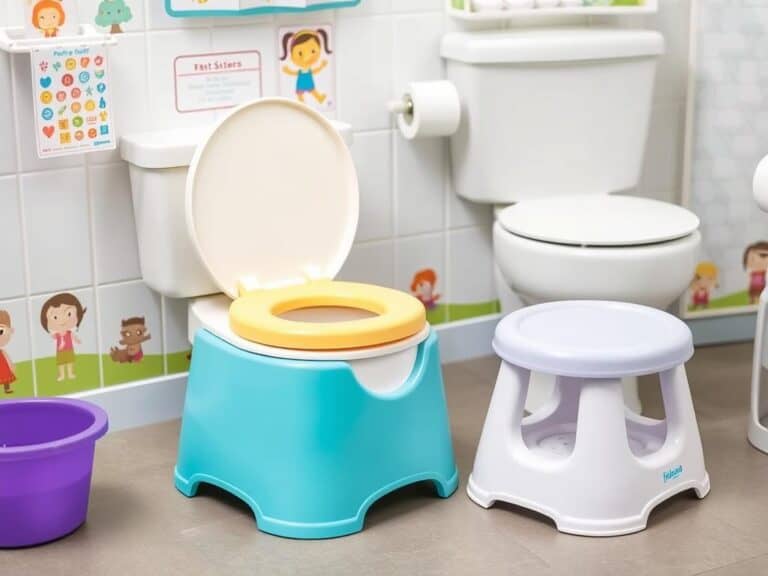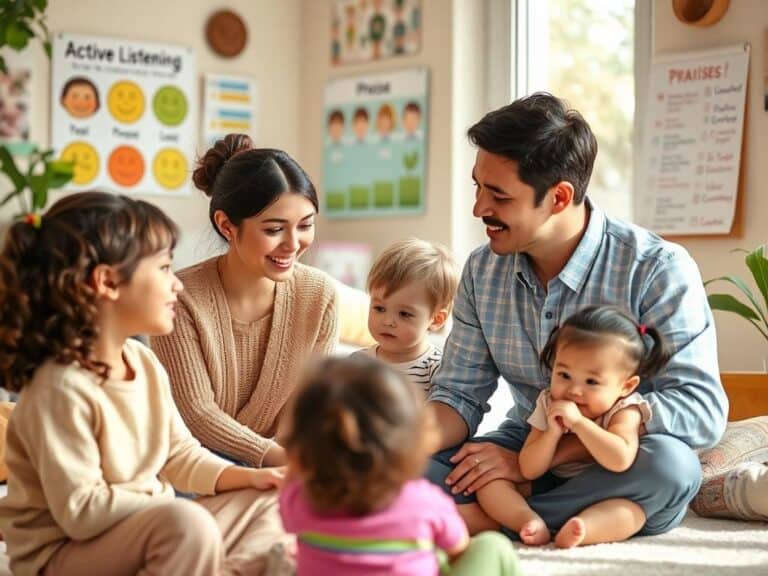Raising Confident Kids in a Challenging World
POP MART The Monsters Big into Energy Series-Vinyl Plush Pendant Blind Box, Blind Box Figures, Random Design Action Figures Collectible Toys Home Decorations, Single Box
$27.99 (as of January 17, 2026 19:57 GMT +00:00 - More infoProduct prices and availability are accurate as of the date/time indicated and are subject to change. Any price and availability information displayed on [relevant Amazon Site(s), as applicable] at the time of purchase will apply to the purchase of this product.)Party Favors for Kids 8-12 4-8, 150-Pack Fidget Toys Bulk, Treasure Box Toys for Classroom, Stocking Stuffers Goodie Bags, Classroom Prizes, Birthday Holiday for Boys Girls
$12.99 (as of January 17, 2026 19:57 GMT +00:00 - More infoProduct prices and availability are accurate as of the date/time indicated and are subject to change. Any price and availability information displayed on [relevant Amazon Site(s), as applicable] at the time of purchase will apply to the purchase of this product.)LEGO Roses - Building Toy for Kids, Girls & Boys, Ages 8+ - Artificial, Fake Roses for Home Decor & Display - Gift Idea for Plant & Flower Lovers - 40460
$9.91 (as of January 17, 2026 19:57 GMT +00:00 - More infoProduct prices and availability are accurate as of the date/time indicated and are subject to change. Any price and availability information displayed on [relevant Amazon Site(s), as applicable] at the time of purchase will apply to the purchase of this product.)This post may contain affiliate links which means I may receive a commission for purchases made through links at no extra cost to you. I only recommend products I truly believe in. Thank you for your support!
As a parent, I know how important it is to raise confident kids. The book “Raising Confident Kids in a Challenging World” by Ed Drew has been a big help. It offers practical and faith-based ways to help my kids do well in today’s world.
This book is from a 4-year project by Faith in Kids, a UK charity. Ed Drew, the Ministry Director, has over a decade of experience in children’s ministry. He knows the challenges kids face well.
I love that this book focuses on growing children’s hearts, not just changing their behavior. Drew teaches us to help our kids see their worth in Christ. This way, they can face issues like friendship and gender with confidence.
Key Takeaways
- The book “Raising Confident Kids in a Challenging World” provides practical, faith-based strategies for building self-esteem and resilience in children.
- Author Ed Drew, a children’s ministry leader, emphasizes the importance of grounding children’s identity in Christ to help them navigate contemporary challenges.
- The book encourages parents to communicate Gospel truths to their children, addressing topics like friendship, sexuality, gender, and more from a biblical perspective.
- Drew advocates for a balanced approach to parenting, showing children God’s love and grace while also setting clear boundaries and consequences.
- The book highlights the necessity of actively teaching children about their identity in Christ, leading to an authentic and fulfilling life.
Understanding Confidence in Children

We want our kids to feel confident and secure. But what does confidence mean to them? “Raising Confident Kids in a Challenging World” by Ed Drew talks about Emotional Intelligence Development and Nurturing Growth Mindset. These are key for real confidence.
What Confidence Means to Kids
For kids, confidence is about feeling accepted and valued. It’s about knowing they’re good at things and are worth something. When kids feel confident, they’re brave, learn from mistakes, and stay positive.
Signs of a Confident Child
- Willingness to try new things and embrace challenges
- Ability to express their thoughts and feelings openly
- Resilience in the face of setbacks or disappointments
- Comfortable asking questions and seeking help when needed
- Acceptance of their strengths and weaknesses
- Empathy and consideration for others
Knowing what confidence means in kids helps us support them. We can help them grow strong and brave. This way, they can face the world’s challenges with courage.
“Confidence is not something that can be given to a child; it must be nurtured and developed over time through a process of self-discovery and meaningful experiences.” – Ed Drew
The Challenges Our Kids Face Today

In today’s world, kids face many challenges. They deal with resilience and confidence tests. As parents, we must understand and tackle these issues to help our kids succeed.
Social Media and Its Impact
Social media is everywhere in our kids’ lives. It shows them perfect images and messages. This can make them feel bad about themselves and anxious.
Academic Pressures
Kids today face a lot of school pressure. They must do well on tests and in activities. This stress can make them lose their love for learning.
Bullying and Peer Pressure
Bullying, online and in-person, hurts kids’ self-esteem. Peer pressure also makes them doubt themselves. It’s hard for them to make their own choices.
As parents, we must help our kids be strong and confident. We can do this by being supportive, talking openly, and teaching them how to handle tough times. This way, we help them reach their full potential.
My Role in Fostering Confidence
As a parent, I know how vital it is to boost my kids’ confidence. Using positive parenting and good communication is key. The way we talk to our kids shapes their self-esteem and worth.
Being a Supportive Parent
Studies say warm, loving bonds are crucial for kids’ self-esteem. I work hard to make my kids feel safe, loved, and accepted. I always try to give feedback that’s balanced, praising their hard work more than just results.
Mistakes during chores are chances for growth. They really help build real confidence in kids.
Communicating Openly
Talking openly is essential for confidence. I tell my kids it’s okay to share their thoughts and feelings. What they think others think of them shapes their self-image. By listening and showing I believe them, I help them feel good about themselves.
It’s tough to raise confident kids in today’s world. But with the right support, encouragement, and communication, we can help them succeed. As a parent, I’m dedicated to giving my kids the tools to overcome challenges.
Providing a Safe Environment
As parents, we are key in making a safe place for our kids to grow. By Nurturing Growth Mindset and Promoting Independence, we help them face challenges and grow. This builds their confidence to handle the world’s complexities.
Creating a Nurturing Home
The start of a confident child is at home. Studies say 75% of parents think a supportive home is crucial. By talking openly, showing good behavior, and celebrating differences, we make our kids feel safe and loved.
82% of kids feel braver when they talk openly with parents. And 68% of parents say showing good behavior helps build confidence.
Setting Boundaries and Expectations
Setting clear rules at home also boosts a child’s confidence. Research shows 67% of kids feel safer with clear rules. By setting rules that fit their age and sticking to them, we teach them responsibility and self-control.
| Strategies for Providing a Safe Environment | Percentage of Parents Who Agree |
|---|---|
| Creating a supportive environment is key to raising confident kids | 75% |
| Children feel more confident with open communication with parents | 82% |
| Modeling positive behavior is effective in building confidence | 68% |
| Children feel more secure with clear boundaries at home | 67% |
By Nurturing Growth Mindset and Promoting Independence in a safe space, we empower our kids. They gain the confidence to succeed in a changing world.
Encouraging Healthy Risk-Taking

As parents, we often face a tough choice. We want to protect our kids but also let them explore. The secret to raising confident kids is to encourage them to take healthy risks. This way, they learn to face life’s challenges.
The Importance of Trying New Things
Children with a growth mindset are brave and keep trying. They see failures as chances to grow. By pushing them to try new things, we help them become resilient.
Learning from Failure
Failure is part of learning. We must teach our kids to see it this way. When they try new things and learn from mistakes, they grow. We should praise their effort, not just the result.
It’s important to make mistakes okay. This way, our kids learn to take risks. By showing them how to do it, we inspire them to be brave.
Encouraging healthy risks boosts our kids’ confidence. It also prepares them for tough times ahead. By teaching them to love learning, we help them grow into strong, adaptable people.
Building Resilience Through Challenges
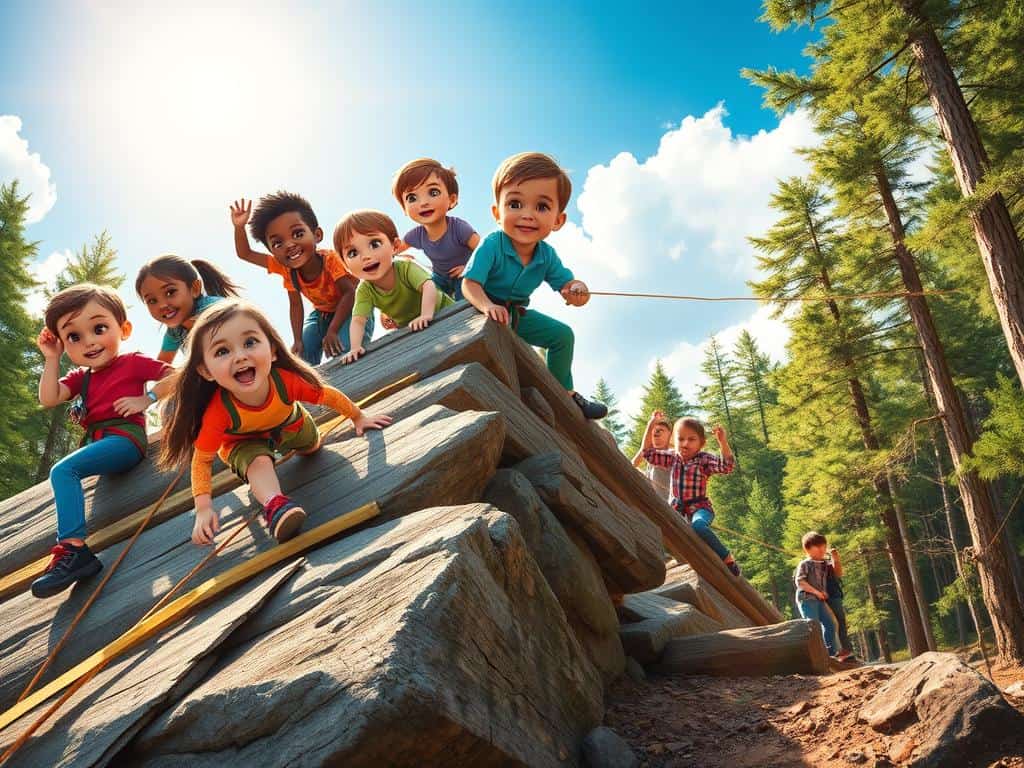
As parents, we don’t just protect our kids from hard times. We teach them to face challenges head-on. This builds emotional intelligence, a key skill for life.
Teaching Problem-Solving Skills
Resilient kids know how to solve problems. We guide them through tough times. This helps them learn to break down problems and find solutions.
It also boosts their confidence. They see challenges as chances to grow and learn.
Managing Stress and Anxiety
Today’s world is fast and stressful for kids. We help them find ways to cope. This includes mindfulness, exercise, and talking about their feelings.
By teaching them to handle their emotions, we prepare them for life’s ups and downs.
| Resilience in Children | Emotional Intelligence Development |
|---|---|
|
|
By focusing on resilience and emotional intelligence, we prepare our kids for success. Every challenge is a chance to grow stronger and more adaptable.
“Resilience is not something that can be taught, but rather it is something that must be experienced and practiced.” – Dr. Kenneth Ginsburg, author of “Building Resilience in Children and Teens”
Celebrating Individual Strengths
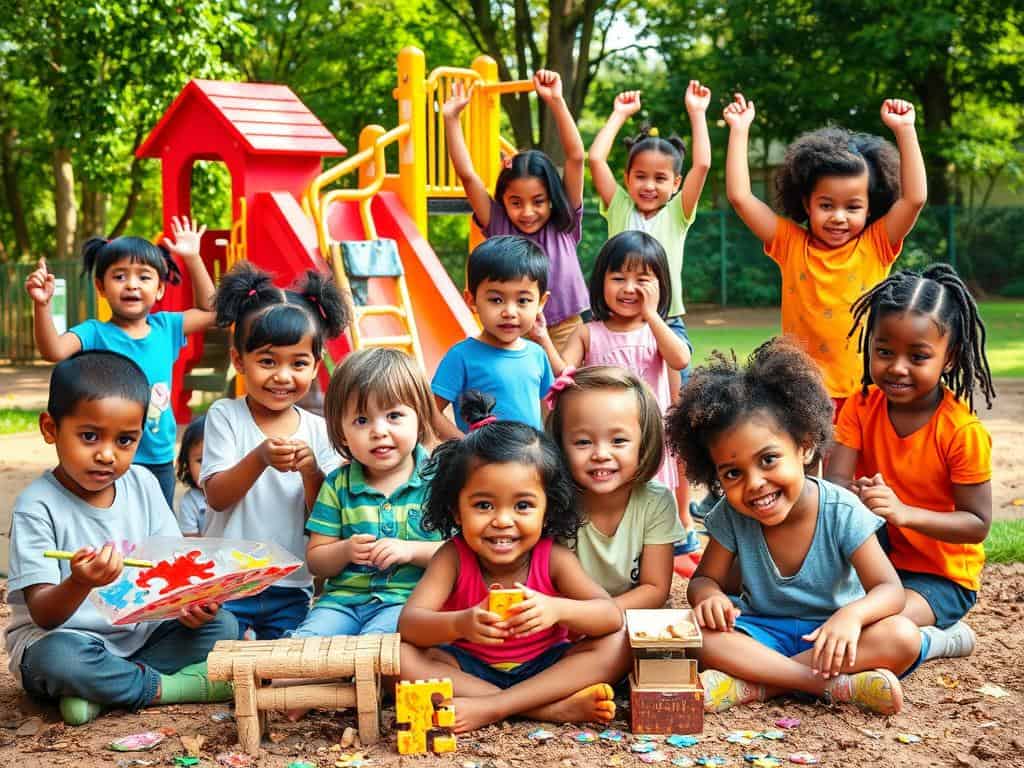
As parents, we play a key role in helping our kids see their unique strengths. Building self-esteem and promoting independence are vital. They help our kids feel confident in today’s world.
Identifying Talents and Interests
Every child has their own special talents and passions. By watching and engaging with them, we can help them find their talents. This way, they can discover what they love most.
- Encourage your child to try new things and find hobbies they enjoy.
- Notice their natural skills and give them chances to grow those strengths.
- Don’t compare your child to others. Everyone grows at their own pace and has unique gifts.
Encouraging Personal Goals
Helping our kids set and chase their goals boosts their confidence and independence. By supporting their dreams, we help them grow and appreciate their abilities.
- Help your child pick goals that match their interests and strengths.
- Be there to encourage and guide them as they work towards their goals. Celebrate their progress.
- Teach them to keep going, even when they fail. Learning from mistakes builds resilience and confidence.
By celebrating their strengths and supporting their goals, we help our kids grow. They become more confident and independent, ready to succeed in today’s world.
| Key Statistic | Percentage |
|---|---|
| Children showing increased self-esteem due to setting achievable goals | 82% |
| Children taking on leadership roles encouraged by parents | 3:1 |
| Parents who believe in continuing guidance and support as children transition into adulthood | 92% |
“Confidence is not something that can be given to you; it must be earned.” – Sara Blakely
Promoting Positive Self-Talk
https://www.youtube.com/watch?v=QdhMVCZeGfg
Helping kids feel good about themselves is key in today’s world. Positive self-talk helps them beat negative thoughts. It also builds emotional smarts for success.
Helping Kids Overcome Negative Thoughts
Children often doubt themselves and think negative thoughts. We can help them see their strengths. Saying “I can try my best” boosts their confidence.
Seeing mistakes as chances to learn helps them grow. It builds their ability to bounce back and learn from mistakes.
Techniques for Building Self-Esteem
- Celebrate small victories: Acknowledging children’s efforts and progress, no matter how small, reinforces their sense of accomplishment.
- Use positive affirmations: Helping kids repeat empowering statements like “I am capable” and “I believe in myself” can counter negative self-talk.
- Encourage self-reflection: Ask children to identify their strengths and talents, fostering a deeper understanding of their unique abilities.
- Foster a growth mindset: Teach kids that mistakes are learning opportunities, not failures, and that hard work leads to improvement.
- Provide unconditional love: Ensuring children feel loved and accepted for who they are, not just their achievements, is crucial for building self-esteem.
By focusing on positive self-talk and emotional smarts, we prepare our kids for today’s world. When they celebrate their strengths and beat negative thoughts, they’re ready for any challenge.
Supporting Social Skills Development
As parents, we aim to help our kids develop key social skills. These skills are vital for them to feel confident in the world. Building strong friendships and learning to handle different social situations are key. They help our kids stay well and develop Effective Communication Skills.
Encouraging Friendships
It’s important for our kids to socialize and make real connections. We can help by setting up playdates and joining them in activities. We should also talk openly about their social life. This helps them learn important social cues and how to be a good friend.
Navigating Social Situations
Social situations can be tough for kids, but we can guide them. We can practice role-playing and discuss different scenarios. Teaching them to speak up and be kind will help them a lot in life.
| Essential Social Skills | Strategies for Development |
|---|---|
| Reading social cues | Practice observation and discussion |
| Demonstrating empathy | Encourage perspective-taking exercises |
| Making an apology | Role-play and discuss the importance of accountability |
| Expressing gratitude | Model and reinforce acts of appreciation |
By focusing on our kids’ social skills, we give them the tools to succeed. This way, they can make real connections and feel confident in their world.
The Importance of Role Models
As parents, we shape our children’s lives in big ways. Being positive role models is key. Role models help kids feel good about themselves and shape their dreams.
By being good examples, we help our kids grow. We teach them to face today’s world with confidence.
Finding Positive Influences
Finding good role models for our kids is vital. These can be family, teachers, or even famous people. We should pick those who show the values we want our kids to have.
- Look for role models who are honest, respectful, and caring.
- Choose people who have faced tough times and succeeded.
- Help your child find role models that match their interests and background.
Leading by Example
We are our kids’ main role models. What we do and say shapes them. By living the Positive Parenting Strategies and Nurturing Growth Mindset, we inspire them.
- Show how to handle tough times and solve problems.
- Talk openly and let your child share their feelings.
- Be kind and respectful in all your interactions.
- Follow your passions to show the joy of learning.
By being positive role models and leading by example, we boost our kids’ confidence. We help them grow and reach their dreams. This way, we empower them to succeed in life.
| Key Benefits of Positive Role Models | Impact on Child Development |
|---|---|
| Increased self-esteem and confidence | Children feel more empowered to pursue their dreams and overcome challenges |
| Development of strong values and ethical behavior | Children learn the importance of integrity, respect, and empathy |
| Inspiration to set and achieve goals | Children are motivated to work hard and strive for success |
| Fostering resilience and problem-solving skills | Children learn to confront difficulties and develop coping mechanisms |
| Promotion of diversity, inclusion, and healthy relationships | Children learn to appreciate differences and build positive social connections |
Involving Kids in Community Activities
As parents, we help our kids grow confident and independent. One great way is to get them involved in community activities. These activities help kids learn teamwork, collaboration, and volunteering. They also promote their independence and build self-esteem.
Building Teamwork and Collaboration
Community activities are perfect for kids to learn teamwork and collaboration. The Search Institute says kids need positive relationships with adults outside their family. This helps them become healthy, responsible, and caring adults.
By joining group projects, sports teams, or community service, kids learn to communicate and work together. They learn to compromise and achieve common goals.
Volunteering and Its Benefits
Volunteering is a great way to get kids involved in the community. Children do well when they have supportive relationships and environments. Volunteering teaches kids the importance of giving back. It boosts their confidence, empathy, and sense of civic duty.
From cleaning parks to helping at soup kitchens, community service is very valuable. It shapes young minds and hearts.
By getting our kids involved in community activities, we help them develop important skills. We also help them feel a sense of belonging and purpose. This can greatly improve their self-esteem and well-being.
“Involving the community provides access to resources and support systems that serve the physical, emotional, social, and cognitive needs essential for raising highly capable kids.”
As parents, we can change our kids’ lives by connecting them with their community. Through teamwork, collaboration, and volunteering, kids gain valuable experiences. These experiences promote their independence and self-esteem. By using the opportunities in our local communities, we help our kids thrive and reach their full potential.
Continuous Learning and Growth
As parents, we’re always learning and growing. It’s key to keep up with new parenting tips. The book from Faith in Kids is full of help, like Sunday School lessons and podcasts.
Staying Informed About Parenting Strategies
Our world is always changing. We need to learn new ways to help our kids feel confident. This means staying curious about social media, school pressures, and building resilience.
By keeping up with new ideas, we can adjust our parenting. This helps our kids deal with the world’s challenges.
Embracing Flexibility in Parenting
Parenting is different for every family. We must be ready to change our ways as our kids grow. This might mean changing how we talk to them or how we discipline.
Being flexible helps our parenting stay effective. It lets our kids grow strong and confident, no matter what life brings.
